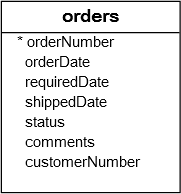Summary : in this tutorial, you will learn about the MySQL NULLIF function and how to use it to prevent the division by zero error in a query.
Introduction to MySQL NULLIF function
The
NULLIF
function is one of the control flow functions that accepts 2 arguments. The
NULLIF
function returns
NULL
if the first argument is equal to the second argument, otherwise it returns the first argument.
The syntax of the
NULLIF
function is as follows:
NULLIF(expression_1,expression_2);Code language: SQL (Structured Query Language) (sql)
The
NULLIF
function returns
NULL
if
expression_1 = expression_2
is
true
, otherwise it returns
expression_1
Notice that the
NULLIF
function is similar to the following expression that uses the
CASE expression
:
CASE WHEN expression_1 = expression_2
THEN NULL
expression_1
END;Code language: SQL (Structured Query Language) (sql)
Note that you should not confuse the
NULLIF
function a similar function called
IFNULL function
.
MySQL NULLIF examples
Let’s take a look at some examples of using the
NULLIF
function to understand how it works.
SELECT NULLIF(1,1); -- return NULLCode language: SQL (Structured Query Language) (sql)SELECT NULLIF(1,2); -- return 1
Code language: SQL (Structured Query Language) (sql)SELECT NULLIF('MySQL NULLIF','MySQL NULLIF'); -- return NULL
Code language: SQL (Structured Query Language) (sql)SELECT NULLIF('MySQL NULLIF','MySQL IFNULL'); -- return MySQL NULLIF
Code language: SQL (Structured Query Language) (sql)SELECT NULLIF(1,NULL); -- return 1 because 1 <=> NULL
Code language: SQL (Structured Query Language) (sql)SELECT NULLIF(NULL,1); -- return NULL the first argument
Code language: SQL (Structured Query Language) (sql)How the statements work.
-
NULIF(1,1)returnsNULLbecause 1 is equal 1. -
NULLIF(1,2)returns 1, which is the first argument, because 1 is not equal 2. -
NULLIF('MySQL NULLIF','MySQL NULLIF')returnsNULLbecause two arguments are the same string -
NULLIF('MySQL NULLIF','MySQL NULLIF')returnsMySQL NULLIFbecause two strings are not equal. -
NULLIF(1,NULL)returns 1 because 1 is not equal toNULL -
NULLIF(NULL,1)return the first argument i.e.,NULL, becauseNULLis not equal to 1.
Using NULLIF function to prevent division by zero error
We often use the
NULLIF
function to prevent the division by zero error in a query. If the MySQL server has
ERROR_FOR_DIVISION_BY_ZERO
mode enabled, it will issue an error when a division by zero occurred.
See the following statement:
SELECT 1/0; -- cause errorCode language: SQL (Structured Query Language) (sql)
In this case, you can use the
NULLIF
function to prevent the division by zero as follows:
SELECT 1/NULLIF(0,0); -- return NULLCode language: SQL (Structured Query Language) (sql)
Because zero is equal to zero, the expression
NULLIF(0,0)
returns NULL. As the result, the statement returns NULL.
Let’s take a look at the
orders
table in the
sample database
.

First, to get all orders created in June 2003, you use the following query:
SELECT
orderNumber, orderdate, requiredDate, shippedDate, status
orders
WHERE
orderDate BETWEEN '2003-06-01' AND '2003-06-30';Code language: SQL (Structured Query Language) (sql)
Second, calculate the number of shipped orders / the number of cancelled orders in June 2003, you use the SUM and IF functions.
SELECT SUM(IF(status = 'Shipped',1,0)) /
SUM(IF(status = 'Cancelled',1,0))
FROM orders
WHERE orderDate BETWEEN '2003-06-01' and '2003-06-30';Code language: SQL (Structured Query Language) (sql)
MySQL issues an error because in June 2003 there was no cancelled order created. It means that expression
SUM(IF(status = 'Cancelled',1,0))
returns zero.
Third, to prevent the division by zero error, you use the
NULLIF
function as the following query:
SELECT